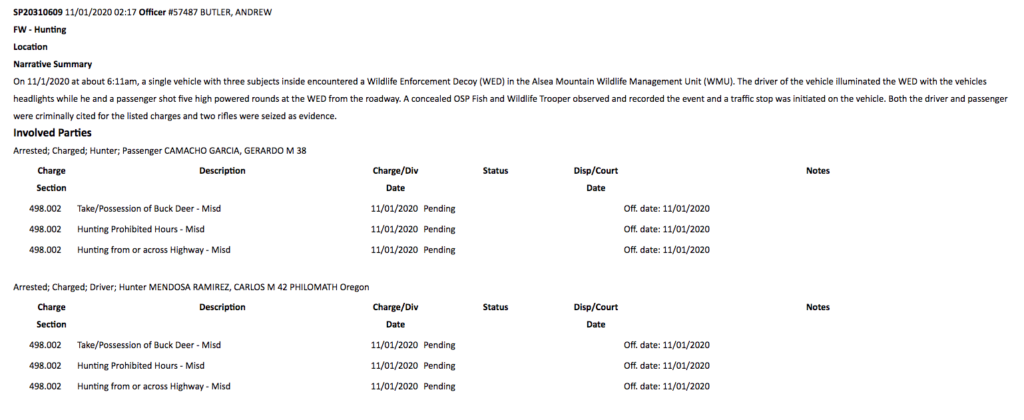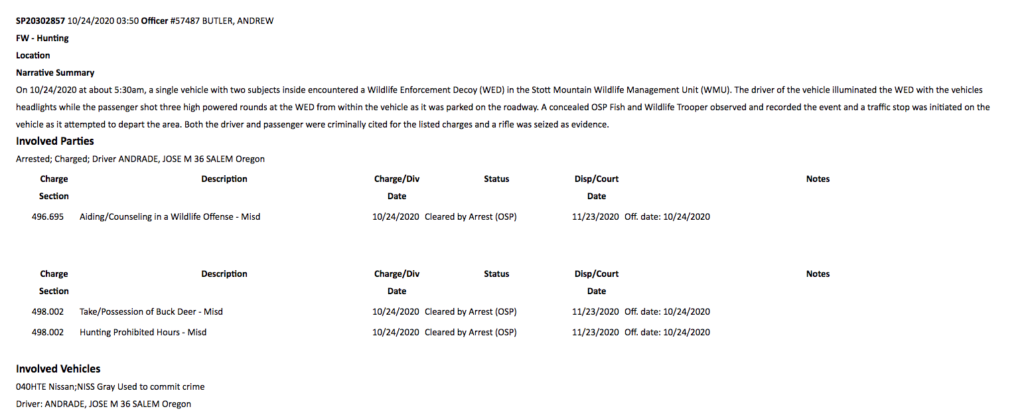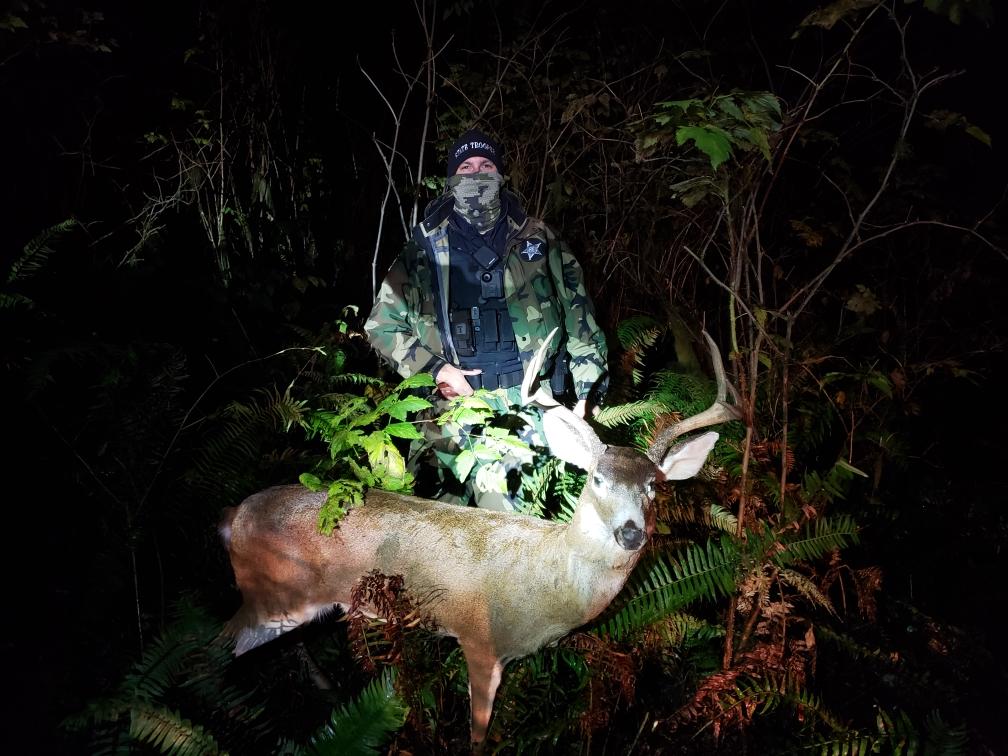
By QUINTON SMITH/YachatsNews.com
The Oregon State Police wildlife troopers hadn’t finished setting up “Scruffy” their decoy deer when a hunter prowling a mountain road in Lincoln County spotted it.
Not quite ready, “we chased him out of there,” said Trooper Andrew Butler.
That was just after sunset Friday, Nov. 6.
Less than an hour later two men used their truck’s headlights to spot the fake deer that Butler and Trooper Aaron Likens had set up in a popular hunting area off Oregon Highway 229 near Siletz.
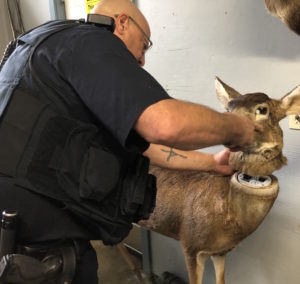
The driver popped out of his truck and fired a shot from his rifle, Butler said. A passenger got out and twice shot over the truck hood.
Busted.
All in a night’s work by two OSP wildlife troopers stationed in Newport – using one of their four lifelike stuffed deer, including a special decoy with a robotic head that swivels like the real thing.
The troopers cited Rusty M. Butler, 41, and Nathan T. Metcalf, 50, of Siletz for three game violations – shooting after dark, shooting from a road, and casting a light to spot a game animal.
Butler said the men told the troopers “they didn’t want to go home empty handed at the end of the (deer) season” which had closed that night 30 minutes after sunset.
Instead, the pair had their rifles confiscated and now face fines ranging from $2,000 to $6,250, thousands of dollars in restitution, and the loss of their hunting licenses for years.
“These offenses are extremely expensive,” says Lincoln County Deputy District Attorney Kenneth Park, who prosecutes wildlife cases brought by state police. “But we have to make it a deterrent, otherwise it would be a free-for-all out there.”
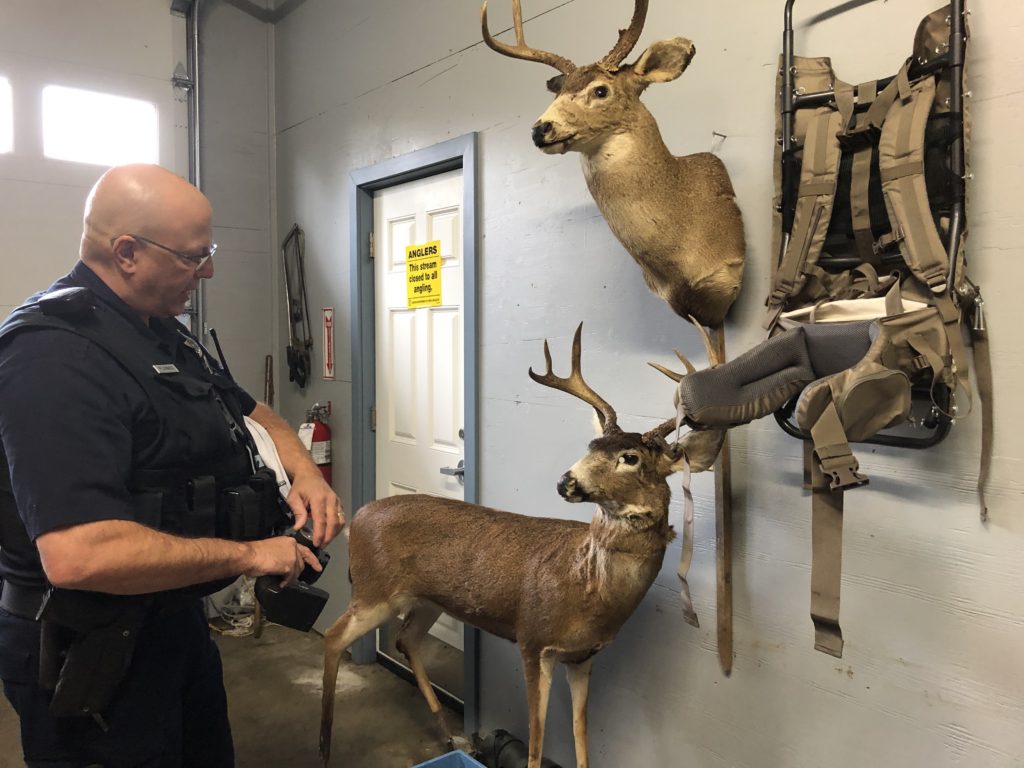
The busiest time of year
It’s the busiest time of year for state police game troopers. There’s salmon in coastal streams, bays are full of crab and clams.
But it’s the general deer season that just ended and the two short elk seasons this month that fill coastal forests with hunters – and poachers.
“There’s a lot of things going on right now,” says Sgt. Greg Plummer, who oversees OSP’s wildlife enforcement in Lincoln and Tillamook counties. “We can’t be everywhere at once, so we bounce around and try to make our presence known.”
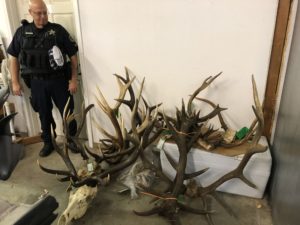
The great majority of hunters are law-abiding and often eager to tip off troopers to those that are not. Oregon State Police run a statewide tip line seeking help on cases, or just encouraging hunters to call when they see something amiss.
It’s that small minority – the poachers hunting without licenses or tags, hunting out of season, spotlighting deer or elk at night and oftentimes leaving the dead animal to waste – that Butler and his fellow wildlife troopers are after.
“Most hunters are good people and care about conservation issues,” said Park. “But you get a few that just don’t care.”
State police wildlife troopers have been using decoys like “Scruffy” since 1991 to help nab poachers.
The effort was greatly enhanced in 1995 when the Oregon Legislature made penalties for shooting at a wildlife decoy the same as shooting at a live animal. In 2005, the agency got its first robotic deer whose head was controlled by a trooper-run joystick making it even more lifelike.
Now wildlife troopers regularly run decoy operations involving deer and elk. Statewide, there are cougar, bobcat and antelope decoys. Soon to come to Lincoln County is a black bear, being prepared by a taxidermist who does 7-12 decoys a year for Oregon State Police.
“We’ll go out and see if we can get some bear shooters,” Plummer said.
Decoy operations are art and science
While officers are hesitant to detail everything, they will say there’s a bit of an art to setting up a decoy operation.
From experience, troopers also know popular deer and elk areas. They also talk regularly to hunters, passing along their cell phone numbers so people can call them directly.
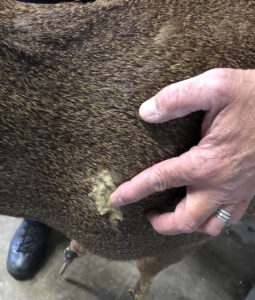
One trooper is stationed near the decoy and one or two others are in trucks nearby serving as the “chase vehicle” once a poacher shoots.
“Safety is No. 1 for residents in the area and for us,” Butler said. “We have a heightened level of awareness … everyone is armed until proven otherwise.”
Rarely does someone resist, Butler said.
“For the most part they’re aware of what they just did,” he said. “When people stop and get out of the vehicle they’re so targeted oriented they don’t see us.
“We have to be creative as we can,” Butler said. “Sometimes you plan and run these things and there’s no one. Then sometimes there’s too many vehicles.”
During deer and elk seasons, Plummer likes to have his wildlife troopers running decoys twice a week. But with manpower shortages or rushing off to other assignments, that’s not always possible.
For example, Butler and wildlife officers from Tillamook County were part of the agency’s tactical response team that Gov. Kate Brown sent to Portland all summer and fall to help with protests. That crippled decoy operations.
Last week, Butler returned from post-election protest duty in Portland on Thursday and Friday night was out in the forest near Siletz running an operation.

Butler has an unusual but strong background for a wildlife trooper. He was an Oregon Department of Fish and Wildlife assistant wildlife biologist covering six counties in the north Willamette Valley for seven years before joining the state police.
“I came here for one reason,” he said. “Being a wildlife trooper on the coast is probably the best because there’s so much going on. You can cover so many species in one day.”
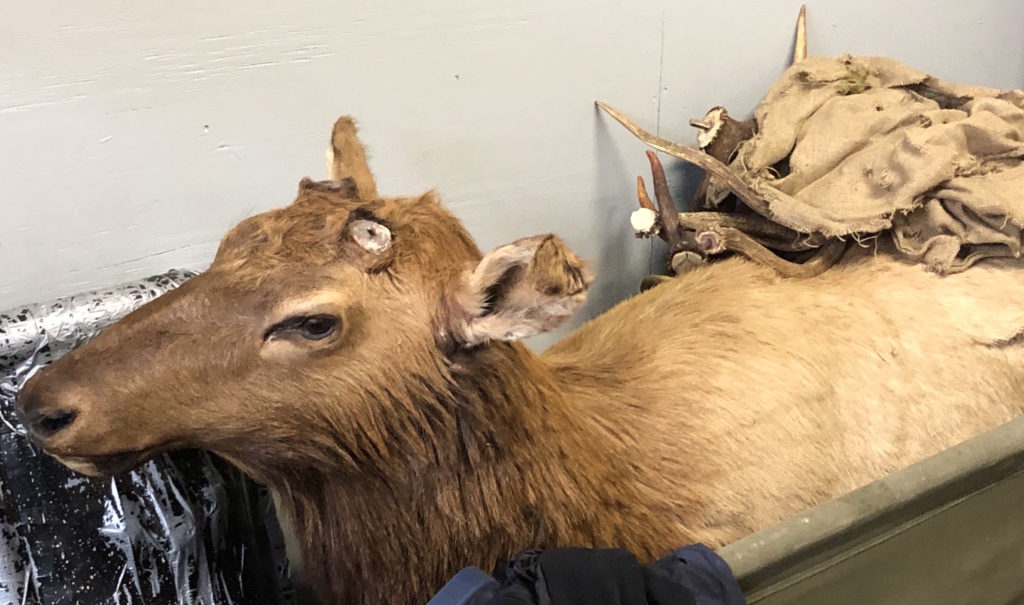
Elk season “all hands on deck”
Now that the general deer season is over, wildlife troopers will turn to elk seasons, a four-day season starting Saturday and then a seven-day season starting Nov. 21.
During deer season troopers cited a number of men from the Willamette Valley. Butler thinks that’s because September wildfires destroyed their normal hunting grounds in the Cascades.
That’s reflected in the misdemeanor criminal cases pursued by the district attorney’s office. Park prosecuted 39 cases in all of 2019. So far in 2020, there have been 48 criminal cases referred to the district attorney’s office – and these do not include a similar amount of citations and resulting fines that troopers issue in the field.
“It’s been extremely busy here on the coast,” Butler said. “And now it’s all hands on deck for elk.”
A sampling of recent OSP wildlife arrests and citations

